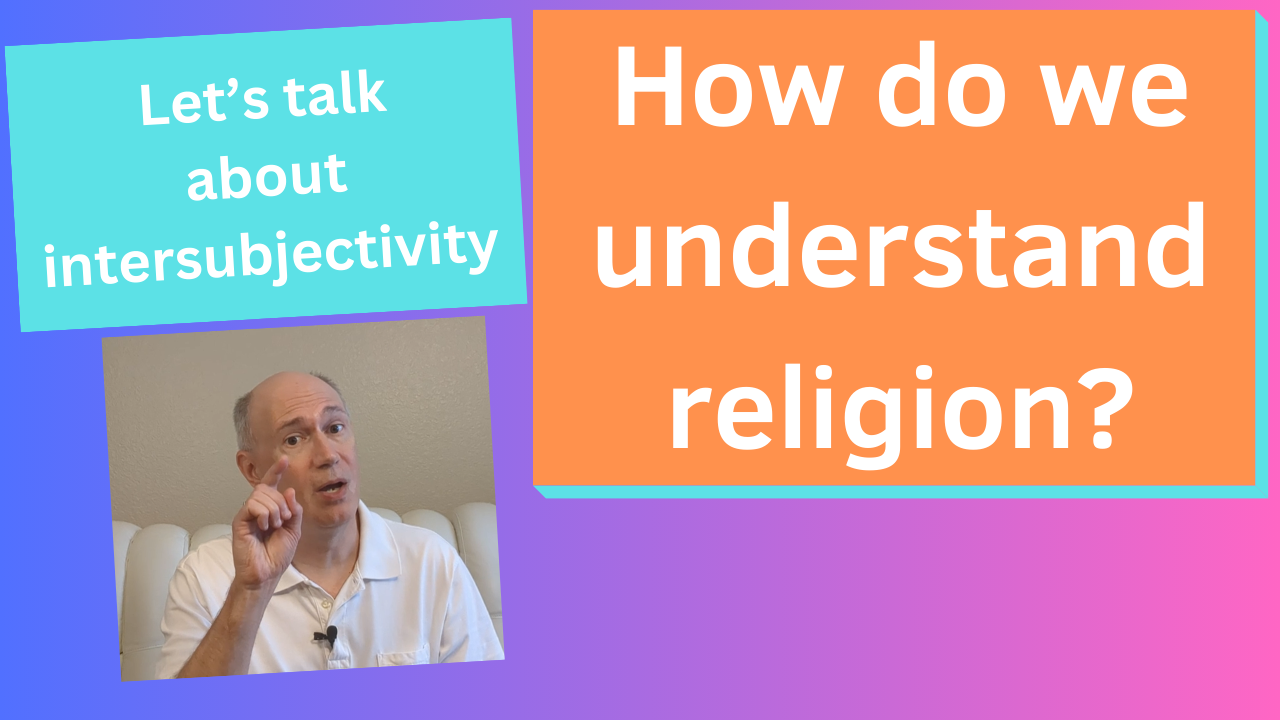01/31/2024 – How do we understand religion?

So, I recently decided to post a comment on a Twitter/X discussion about hermeneutics and suddenly found myself in a convo with a person who thought that hermeneutics was about getting at what the historical author really meant, especially when it came to biblical authors. Now granted, many social media platforms aren’t really conducive to productive dialogue and thus aren’t really that social, including YouTube, but I mistakenly thought I could move the needle a little bit. As it turns out I was incorrect in that assumption. So, being motivated by that experience I wanted to say a little bit about how we understand religion from a philosophical perspective. This is gonna be fun. Check this out. This is TenOnReligion.
Hey peeps, it’s Dr. B. with TenOnReligion. If you like religion and philosophy content one thing I really need you to do is to smash that sub button because it really helps out the channel. The transcripts are available at TenOnReligion.com and new episodes are posted about every two weeks, around noon, U.S. Pacific time, so drop me some views.
I want to talk a little bit about intersubjectivity today, or what the philosopher Husserl sometimes calls “We-subjectivity.” Then I want to explain that the historicity of understanding that develops over time necessarily effects (as in generates, colors, or shapes) all of the possible ways we could understand both past texts or events and therefore also the possible ways we could understand and interpret religion today for our lives. To say otherwise is both a misunderstanding of what history is and how we access it.
Let’s start with intersubjectivity and we’re gonna get a little philosophical here before we connect this up to religion so hang on tight. Sticking with Husserl, he states that when we see another person, it appears only as another object in the world. But we are somehow able to recognize it as a lived body just like my own. We realize that it has a consciousness, but also realize that it is ultimately inaccessible. We can’t really think another person’s thoughts, philosophically speaking. But by empathy we can think about what’s it’s like to be the other person’s lived body, meaning, what it’s like to be them must be a lot like what it’s like to be me. We recognize others by empathy. Now here’s where it gets interesting because my experience of the objective world, a world outside of myself, implies intersubjectivity whereby other selves are experiencing the same world. This extends to language. My language is meaningful only because it’s the same shared language of some linguistic community. Likewise, my habits and the way I live my life is a product of some community’s history. The foods I eat, the recreational activities I engage in, my personal hygiene regimen are all activities learned through socialization in a particular community. I did not personally create or generate any of the norms to which I adhere in my behavior and thoughts. I inherited them by virtue of being a member of some community. What I’ve just done is a simple rudimentary disproof of methodological solipsism, the idea that everything occurs only in my own mind. The failure of methodological solipsism is a kind of proof of intersubjectivity – we all live and act in a shared world. Now obviously this is true not only for me, the individual ego, but we, in living together, have the world pregiven in this “together,” as the world valid as existing for us and to which we belong together. We are constantly functioning together, using objects pregiven to us in common, thinking together, valuing, planning, and acting together. Husserl calls this “we-subjectivity” which somehow remains anonymous because no one person is responsible for creating it. It just develops and exists over time as different layers of culture. Husserl then refers to the world created by this “we-subjectivity” as the “life-world.” Why is this so important for understanding religion? Hang on, we’ll get there.
Let’s skip a few generations. Husserl’s student was Heidegger, and Heidegger’s student was Gadamer. In Gadamer’s most famous work Truth and Method he talks about Husserl’s philosophy quite a bit. He writes that with the concept of a horizon Husserl is obviously seeking to capture the way all limited intentionality of meaning merges into the fundamental continuity of the whole. A horizon is not a rigid boundary but something that moves with one and invites one to advance further. For everything that is given as existent is given in terms of a world and hence brings the world horizon with it. The all-embracing world horizon is constituted by a fundamentally anonymous intentionality. Again, anonymous because it is not achieved by anyone by name. Gadamer mentions that Husserl calls this phenomenological concept of the world “life-world,” the world in which we are immersed in that never becomes an object as such for us, but that represents the pregiven basis of all experience. As a horizon phenomenon, “world” is essentially related to subjectivity, and the “life-world” exists in a constant movement of relative validity. The concept of the life-world is an essentially historical concept, the whole in which we live as historical creatures. It is at the same time a communal world that involves being with other people as well. Now, how does this not sound a lot like it could be describing religious communities?
Let’s take this a step further. Prejudice is a word which has developed a lot of bad connotations but actually the term wasn’t always understood that way. Husserl described prejudices as things that are taken for granted. All prejudices are obscurities arising out of a sedimentation of tradition, and for him that also included philosophy. Gadamer stated that “prejudice” means a judgment that is rendered before all the elements that determine a situation have been finally examined. Basically, not enough information. It is not yet positive nor negative, for future evidence or information can swing it either way. Gadamer’s analysis shows how the hermeneutic understanding demands a self-understanding. In order to understand the past, it is necessary to try to understand one’s own presuppositions and prejudgments in order to realize how these mediate one’s perception of the past. Gadamer’s term “horizon” is an attempt at describing the situatedness or context-bound character of interpretation. Unlike the literalist or objectivist, who believes that his observation is neutral, Gadamer argues that one person’s perception of another situation is always laden with the previous understanding of his own situation. It is impossible to separate oneself completely from one’s own horizon. When trying to understand a text from the past, the interpretation is necessarily incomplete, since further questions about one’s own situation have to be answered in order to know how these influenced one’s questioning of the past. Further, the interpretation is itself provisional because it is conditioned by its own historical setting and by certain interests. Now you’re starting to understand my Twitter/X convo I mentioned at the opening of this video.
Any inquiry or investigation believed to be without prejudice or bias is in denial of its own conditioned ways of understanding. The impact of Heidegger and the hermeneutical circle also is the realization that when we interpret texts our presuppositions and biases will manifest themselves just as much as they do in our exegesis of life and the world. Our historicity cannot be overcome no matter how hard we may try to approach a text without prejudices and preconditions. We cannot interpret a text as if it has pure meaning or significance in itself. To understand a text is never to unravel the intended meaning of the author or the fixed meaning of the text on its own. Rather, we will always understand the text out of the possibilities or horizons of our own being. Why is that the case? Think about history in general for a second. What is history? History is not everything that has happened in the past. History is only what can be demonstrated by evidence. And the way we interpret and understand that evidence is effected (as in generated, colored, or shaped) by intersubjectivity – Husserl’s “we-subjectivity,” or Gadamer’s word, our “horizon.” That doesn’t mean we shouldn’t try to understanding past authors, texts, and events. It just means we should realize that we can only approximate that on a sliding scale of probability based on the available evidence coupled with our colored or shaped interpretations of the amount of evidence we have been exposed to.
So, to connect this to religion, especially traditions like Judaism, Christianity, or Islam, means that we always understand and interpret based on our horizon which is largely generated by the communities we have been raised in and/or ones we have participated and engaged in over the course of our life. Such communities have a long history of interpreting particular people, texts, and events and that entire history of interpretation is part of our horizon and necessarily limits the possibilities of how we might interpret those people, texts, and events. This is why Eastern Orthodox communities, Roman Catholic communities and Protestant communities all interpret Christianity differently. Or why various strands of Judaism or Islam interpret their traditions differently. In fact, the very reason we are even interested in particular people, texts, and events from the past comes from our horizon. To use Christianity as an example, if we want to learn more about some New Testament figure or text like Paul the apostle or the gospel of John, it actually doesn’t start with them. It actually starts with us. For further explanation on this, check out my episode a few years ago on the Death of the Author. Especially the section on Roland Barthes near the end of the video. It’s good stuff. But that’s it for today.
So, what do you think about the explanation of how we understand religion? Leave a comment below and let me know what you think. Until next time, stay curious. If you enjoyed this, support the channel in the link below, please like and share this video and subscribe to this channel. This is TenOnReligion.


